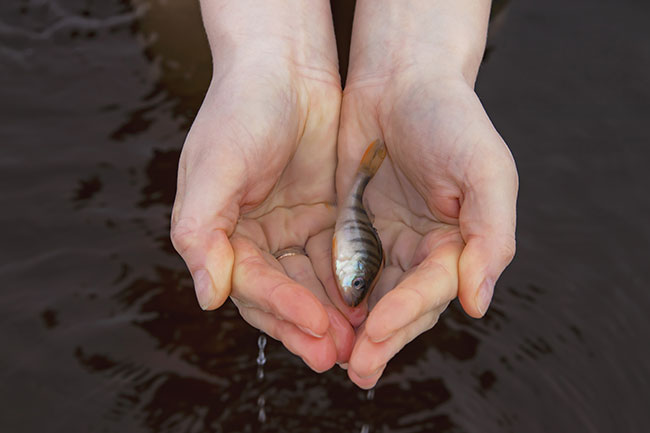
Features
Opinion
Power Struggle: Happiness as a compensated energy
Happy fish will keep systems running smoothly, which in turn, will make for happy farmers.
November 8, 2024 By Maddi Badiola
 Happy fish will keep systems running smoothly.
photo: GETTY IMAGES/ Andrey Iudin
Happy fish will keep systems running smoothly.
photo: GETTY IMAGES/ Andrey Iudin After years of studying, working hard, prioritizing my profession, along with my family and friends, but giving up fun plans, parties, and other joyful moments, I am seeing the light at the end of the tunnel as they say. I am harvesting the fruits of my effort.
It was 25 years ago when the film, Armaggedon, was released. I watched that movie nine times at the theatres (my mom knows it well). I was crazy about it. And now, and after people have asked me numerous times ”When and why did you realize that you like it here in the U.S.? That you wanted to become American?” I think I know the answer.
Twenty-five years fighting for what I have achieved. I am officially a permanent U.S. resident (in three years I will apply for the blue passport!). I have a family here, I am making friends everyday, I got a brand new car (half of it still belongs to the bank), and I have just become tenant of a tiny, but super cozy and beautiful apartment in Hendersonville, North Carolina.
I am happy and happiness brings positive things. Good vibes are shared with the ones that are around you and all of that attracts and makes everything better. Same happens in RAS aquaculture, same happens with fish, and consequently, with fish farmers/managers and investors.
Happy fish will keep systems running smoothly (and vice versa) and this will have two positive outcomes: 1) better tasting product for consumers, and 2), efficiently performing systems. This means that among other things, lower energy consumptions. Inherently, both of these will make farmers happier, as they will see their marketed product being sold and their energy costs go down.
But what makes a fish happy? How can a farmer make his/her animals feel comfortable so they grow according to the planned production plans?
Environmental enrichment can help to reduce stress and improve health and wellbeing of the fish. This leads to better results (i.e. better product and profits). Healthy farmed fish are advantageous as fish farmers depend on high survival rates and marketing healthy fish in order to keep businesses operating.
Fish nutrition, feeds, and feeding management play important roles in increasing the productivity of aquaculture RAS farms. A nutritionally balanced feed and adequate feeding are important factors that maximize fish production and profitability.
Another important aspect playing a major role in overall fish health and performance is achieving and maintaining good water quality through all stages of production. We could say that water quality is one of the most (if not the most) important factor affecting fish health and performance in aquaculture production systems. Fish are totally dependent on the water in which they live.
And what makes a fish farmer happy? People that know me call me minimalist. I do not need many things to be happy. I do not like overusing resources without the real need and I like to know for what I am paying for. I guess a farmer should be the same: knowing where the energy is used well.
Using less energy means paying less for it, right? It is true that terms like “energy consumption”, “energy efficiency”, “energy management” are more openly and commonly used by vendors at tradeshows for example. Reflecting on my year of attending and hosting RAS-related conferences, I have to admit that energy is still the forgotten cost. And I am starting to think that I am becoming a bit annoying with this topic!
Yes, we, as an industry, may be more aware than years before but still, the importance is not there. At the RASTECH 2024 conference, several presentations posed the importance of data. Measuring as many parameters as possible, knowing our systems to the very tiny detail, being able to react to any sudden change, is crucial for a system’s (and the fish’s) healthy performance.
As American business theorist, W. Edwards Deming, said only that which is measured and recorded can be improved. Only the numbers are the proof of our performance and will give the answers to our investors’ questions. And at the end, is it not investors’ happinness and serenity that will keep us working? And so, among others, would it not be better to be paying less in energy, decreasing operational costs, and thus having more margin for profits?
As I mentioned in my last article, and according to the law of conservation of energy, energy is neither created nor destroyed. It changes from one form into another and is transmitted from one body/object to another. The same happens with happiness. A happy fish will result in a healthier, good-looking product, resulting in better profits, and a happy farmer will treat and look for his/her fish with more care producing happier fish.
Every effort in life, sooner or later, is paid. Let’s make this industry more efficient and less resource consuming. Aquaculture is very important to the future of the food industry and our successors will pay for our efforts.
 Maddi Badiola, PhD, PM, is a RAS engineer and co-founder of HTH Full Spectrum based in Basque Country, Spain and USA. She is executive director of the Florida Marine Aquaculture Coalition. Her expertise include energy conservation, lifecycle assessments and RAS global sustainability assessments. Email her at mbadiolamillate@gmail.com.
Maddi Badiola, PhD, PM, is a RAS engineer and co-founder of HTH Full Spectrum based in Basque Country, Spain and USA. She is executive director of the Florida Marine Aquaculture Coalition. Her expertise include energy conservation, lifecycle assessments and RAS global sustainability assessments. Email her at mbadiolamillate@gmail.com.
Print this page